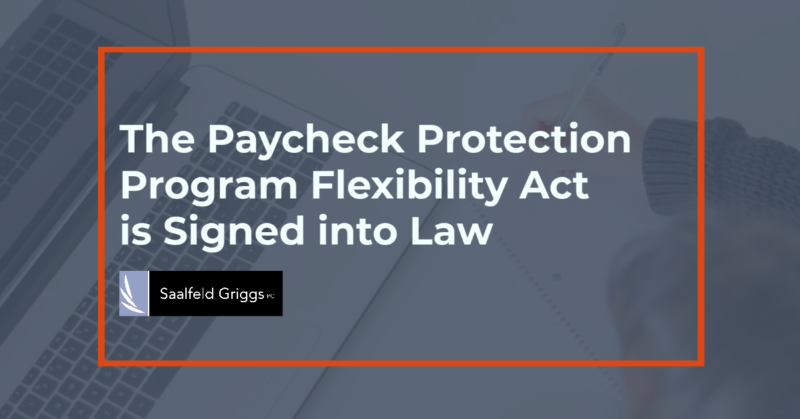By Caleb Williams, Attorney in the Business & Taxation Law Practice Group
On June 5, the Paycheck Protection Program Flexibility Act (PPPFA) was signed into law, providing Paycheck Protection Program (PPP) borrowers with greater opportunity to have their loan partially or completely forgiven. The PPPFA modifies the Small Business Act and the CARES Act to provide borrowers with extended forgiveness periods, less stringent forgiveness requirements, and longer repayment terms. We have summarized these modifications below.
Extension of Forgiveness Period
The PPPFA extends the forgiveness period from 8 weeks to the earlier of 24 weeks from origination of the loan or December 31, 2020. PPP loan forgiveness continues to be reduced based on a borrower’s reduction of full-time equivalent (FTE) employees and a borrower’s reduction in employees’ compensation after February 15, 2020. However, the extended forgiveness period under the PPPFA will provide PPP borrowers with additional time to restore FTEs and compensation to their February 15, 2020 levels, allowing for greater opportunity for loan forgiveness.
Workforce Restoration Flexibility
In addition, the PPPFA provides for two new exceptions to the workforce restoration requirement, providing borrowers the opportunity for loan forgiveness even if they are unable to restore FTEs and compensation to their February 15, 2020 levels. First, loan forgiveness will not be proportionately reduced if the borrower is unable to rehire former employees or hire new qualified employees. Second, loan forgiveness will not be proportionately reduced if the borrower is unable to return to pre-pandemic business activity levels due to COVID-19 related health and safety standards and requirements. Both of these exceptions must be documented in good faith by the PPP borrower.
Percentage of Payroll Costs
Previously, 75% of the amount forgiven had to be spent on payroll costs to avoid negatively impacting loan forgiveness. The PPPFA reduced this requirement to 60%. However, if this 60% threshold is not met, no part of the PPP loan will be forgiven.
There have been indications from legislators that it was not their intent to require 60% of the PPP loan to be used toward payroll costs in order to qualify for forgiveness, but instead to proportionately reduce the number of costs eligible for forgiveness. Keep an eye out for a fix to this provision.
Loan Deferral and Repayment Periods
The deferral period for repayment and the maximum loan term was also modified by the PPPFA. Repayment of the PPP loan now begins on the date that the loan forgiveness amount is remitted to the lender. Additionally, new PPP borrowers will have 5 years to repay the portion of the PPP loan that is not forgiven. Existing borrowers may extend their repayment period from the current 2 years to 5 years, upon agreement by the borrower and its lender.
Regarding payroll taxes, before the PPPFA, only PPP borrowers with loans that were not forgiven were eligible to defer Social Security taxes. Now, all PPP borrowers, including those who have their loan forgiven, may defer Social Security taxes that are due between March 27, 2020, through December 31, 2020, with 50% of such taxes due on December 31, 2021, and the remaining 50% due on December 31, 2022.
One aspect of the PPP loans that was not modified by the PPPFA is the deadline to apply. If your business is interested in applying for a PPP loan, the deadline to apply remains June 30, 2020.
You can learn more about PPP loans by visiting our COVID-19 Resource Page or by visiting the U.S. Small Business Administration’s website. Please contact our office if you have any questions regarding the PPP or your business’ eligibility for a forgivable loan.
Caleb Williams is a partner in the Business & Taxation Law practice group and a member of the Agri-Business and Wine & Vine industry teams. The information in this article is not intended to provide legal advice. For professional consultation, please contact Caleb at cwilliams@sglaw.com at Saalfeld Griggs PC. 503.399.1070. © 2020 Saalfeld Griggs PC

